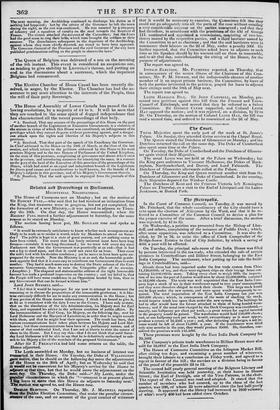be ifirfropufist.
In the Court of Common Council, on Tuesday, it was moved by Mr. Pritchard, that the whole constituency of the City should have a veto upon the election of Alderman by the Ward, and that it be re- ferred to a Committee of the Common Council to devise a plan for the proper exercise of the same. After a brief discussion, the motion was rejected, by 41 to 35.
On Wednesday, a petition was presented from the Bishop of Lien- duff, and others, complaining of the nuisance of Puddle Dock ; which, after some opposition, was referred to a Committee. It was also de- cided, by 78 to 76, to unite the office of Clerk Comptroller of the Bridge-house Estates to that of City Solicitor, by which a saving of 400/. a year will be effected.
On Tuesday, the principal sale-room of the India House was filled by persons interested in the tea trade, who attended the sale of certain premises in Crutchedfriars and 13illiter Street, belonging to the East India Company. The auctioneer, when putting up for sale the build- ings in Crutchedfriars, said— Already there had been iniported under the free trade system front Chin's 11,120,000lb. of tea, and there were eighteen ships on their voyage home con- taining 13,880,0001h. more. Taking evety chest to weigh 801b the importa- tion of tea into the port of London would soon be about 25,000,000lb. contained in 312,000 chests. The trade was well acquainted that the East India Com- pany kept a stock of tea in their warehouses equal to two years' consumption, and they were therefore obliged to stack their chests. This huge stock would not be kept under the new system, and more space would consequently be re- quired. The total importation of the East India Company last year was 380,000 chests ; which, in consequence of the mode of stacking she stock, would require much less space than under the new system. The buildings he had to offer would have the favour attached to them of being bonded ware- houses; and if the usual rent charged by the Dock Company was considered,— namely, one halfpenny per chest per week,—a great return for capital invested in the property would be gained. The warehouses would hold 150,000 chests; and, at one halfpenny each per week, would, extraordinary as it must appear, produce a returu of 16,2501. a year ; and, after deducting all charges, a net in- come would be left of about 14,000/. a year. If the warehouses were filled only nine months in the year, they would produce 9500/. Ile, therefore, con- sidered the premises worth 142,500/. These premises were bought by the East India Dock Company for 70,500/.
The Company's private trade warehouses in Billiter Street were also sold for 16,000/ to the East India Dock Company.
The House of Commons Committee on the Islington Market Bill, after sitting ten days, and examining a great number of witnesses, brought their labours to a conclusion on Friday week, and agreed to a report in favour of the bill ; the number on a division being in favour of the proof of the preamble 23 to 12. The second half-yearly general meeting of the Belgrave Literary and Scientific Institution was held yesterday, at their house in Sloane Street ; the Earl of Denbigh, one of the Vice. Patrons, in the chair. The report of the Council was read and adopted. It stated that the number of members who had entered, up to the close of the last quarter, was 238, of whom 25 were admitted since the last half-yearly meeting. It appeared that the library had increased to 1850 volumes, of whiel nearly 400 had been added since October.


























 Previous page
Previous page